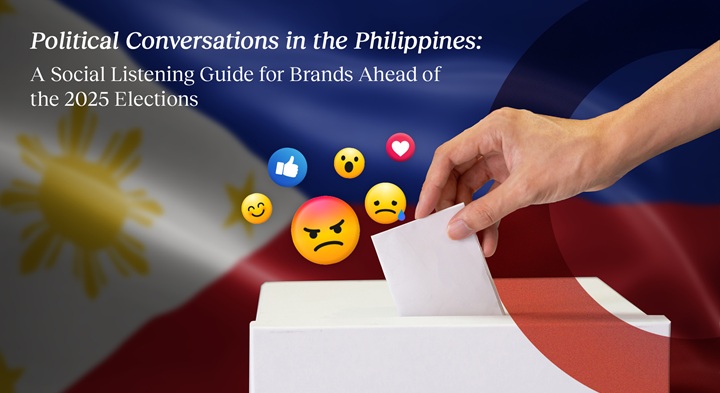
The Philippines is gearing up for the 2025 midterm elections in May and Filipinos are turning to social media to express political sentiments, access information about candidates, and engage in public discourse.
Southeast Asia communications consultancy Vero conducted social listening to analyze conversations across platforms and demographics. With Filipinos being some of the world’s most chronically online, the exercise sought to identify the most talked-about profiles and topics, as well as the volume of political and election-related conversations that could offer a glimpse into the possible direction and outcomes of the elections. The findings from the research also serve as a guide for brands as they navigate a season defined by high stakes, polarized audiences, and constant public scrutiny.
High-profile names, including Vice President Sara Duterte and President Ferdinand Marcos, Jr., as well as Pasig Mayor Vico Sotto emerged as the most searched political names from May 2024 to February 2025. The public disagreement between the two highest officials was widely discussed online—and drew significant media attention—as people raised questions about political stability and effective governance.
There was also an expected uptick in searches for COMELEC (Commission on Elections), precinct finder, and registration, reflecting Filipinos’ need for voter education and practical guidelines for participating in the polls.
Millennials (44%) and Gen Z (27%) are the primary drivers of political and election–related discussions, especially on Facebook, which accounts for more than 86% of all buzz volume. Vero’s research also found that conversations are concentrated in Metro Manila, but there were minimal differences in terms of content between Metro Manila and the rest of the country.
Approximately 6 out of 10 social media posts bear criticisms against politicians and government officials, with 63% of the conversations centered on calling out perceived abuses of power, dishonesty, and lack of transparency. In contrast, praises for political figures only account for 11% of buzz volume. These findings point to Filipinos’ strong demand for integrity and accountability from their leaders.
Fake news and misinformation, foreseen to “get worse” as elections near, are also prevalent online, particularly in the forms of political propaganda and historical revisionism. These have shaped Filipinos’ perspectives and opinions, and discussions surrounding unverified information have often resulted in word wars between supporters and critics of key political figures.
Vero’s social listening exercise also found frequent—and often heated—exchanges about popular influencers and celebrities, including Nadine Lustre, Toni Gonzaga, Zeinab Harake, and Vice Ganda. Online conversations surrounding influencers and the Philippine elections increased by 124% during the election period. This trend is likely to continue as previous administrations utilized and legitimized influencer work to advance their political agendas.
As online discourse among Filipinos intensifies ahead of the elections, it is important for brands and organizations to tread carefully. With 78 million voters closely monitoring developments, it is both an opportunity and challenge to take a stand without alienating key audiences or compromising brand values.
“In a political climate where emotions run high and timing is everything, brands need to be smart about how they show up online. Filipinos tend to take pride in and identify with their chosen leaders, so it is best to tread carefully,” said Vero’s Paulus Soriano.
The reputation risks posed by misinformation and fake news can be significant for brands. Cris Pescadero, also of Vero, strongly advises brands to fact-check and demonstrate accountability and transparency when broadcasting their political stance.
“Being labeled as a source of fake news and misinformation is almost irreversible and will damage the brand’s corporate identity. It is more than necessary—not only during the elections—for brands to stay vigilant, to always verify every message, and to communicate with purpose,” added Pescadero.
Vero experts recommend that brands respect the diverse views of their audience, remain authentic in their messaging, and uphold integrity in all actions.

